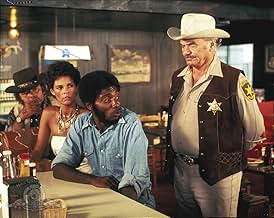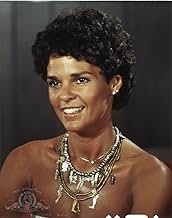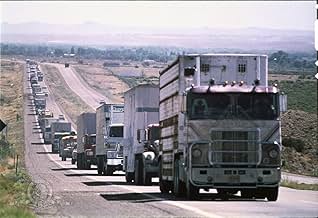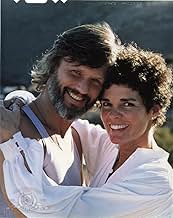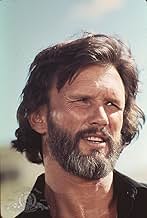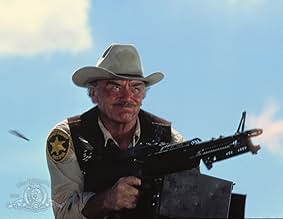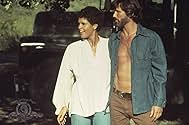IMDb रेटिंग
6.3/10
20 हज़ार
आपकी रेटिंग
ट्रक चालक एक अपमानजनक शेरिफ के साथ एक ट्रक के प्रतिशोध के समर्थन में एक मील लंबा "काफिला" बनाते हैं।ट्रक चालक एक अपमानजनक शेरिफ के साथ एक ट्रक के प्रतिशोध के समर्थन में एक मील लंबा "काफिला" बनाते हैं।ट्रक चालक एक अपमानजनक शेरिफ के साथ एक ट्रक के प्रतिशोध के समर्थन में एक मील लंबा "काफिला" बनाते हैं।
- पुरस्कार
- 3 जीत और कुल 1 नामांकन
Jackson D. Kane
- Big Nasty
- (as J. D. Kane)
Billy Hughes
- Pack Rat
- (as Billy E. Hughes)
Bill Coontz
- Old Iguana
- (as Bill Foster)
Tommy J. Huff
- Lizard Tongue
- (as Thomas Huff)
Allen Keller
- Rosewell
- (as Allen R. Keller)
फ़ीचर्ड समीक्षाएं
Sam Peckinpah's 'Convoy' works as, if nothing else, a little cultural/pop cultural archeology. Based on a novelty song that was itself a product of a short-lived CB (citizen's band) radio/trucker craze that swept the States in the mid 70s, it offers up a rather vivid slice of life from the days of malaise. It was one of several such films ('Smokey and the Bandit', 'Breaker! Breaker!', 'White Line Fever') trying to cash in, but this one is notable for the presence of Peckinpah behind the camera (though how much the struggling Peckinpah was actually behind said camera is apparently open to debate).
'Convoy' is a tough film to nail down. At times it veers into the dadgummit, cornpone comedy territory of Smokey and the Bandit, and at others it evokes a more traditional Peckinpah zeitgeist. Ironically, it probably works best when it straddles that line. At those times, 'Convoy' offers up a broadly entertaining action yarn, with colorful characters occupying simple, well defined turf. I wish Peckinpah and Co. had somehow been able to marry that more cohesively to his standard themes while leaving the broad yucks out of the equation.
'Convoy' is a tough film to nail down. At times it veers into the dadgummit, cornpone comedy territory of Smokey and the Bandit, and at others it evokes a more traditional Peckinpah zeitgeist. Ironically, it probably works best when it straddles that line. At those times, 'Convoy' offers up a broadly entertaining action yarn, with colorful characters occupying simple, well defined turf. I wish Peckinpah and Co. had somehow been able to marry that more cohesively to his standard themes while leaving the broad yucks out of the equation.
Truckers form a mile long "convoy" in support of a trucker's vendetta with an abusive sheriff (Ernest Borgnine and his amazing facial hair)... Based on the country song of same title by C. W. McCall.
While the film will obviously be compared to "Smokey and the Bandit" (both featuring semi trailers being hounded by a sheriff), let it be known that they are not at odds and actually complement each other well (a good double feature, perhaps).
Is Kris Kristopherson the same as Burt Reynolds? No. Is Ernest Borgnine the same as Jackie Gleason? Of course not. So it is sort of like the same story told in two different worlds. This one is a bit lighter on the comedy and much lighter on the romance.
While the film will obviously be compared to "Smokey and the Bandit" (both featuring semi trailers being hounded by a sheriff), let it be known that they are not at odds and actually complement each other well (a good double feature, perhaps).
Is Kris Kristopherson the same as Burt Reynolds? No. Is Ernest Borgnine the same as Jackie Gleason? Of course not. So it is sort of like the same story told in two different worlds. This one is a bit lighter on the comedy and much lighter on the romance.
CONVOY, even after almost 30 years since it was released, remains was it was, an iconic American film by an iconic American director. This movie,which is not short on American archetypes, from Ernest Bornine's vile redneck sheriff "Dirty Lyle," to Kris Kristofferson's independence-loving "Rubber Duck," to Ali MacGraw's free-spirited "Melissa," is really an old-fashioned Western, but with trucks. LOTS of trucks. Like Clint Eastwood's "man with no name" gunslinger, Kristofferson (who steals every scene with his smile and blue eyes) is a man whose sense of honour and justice compels him to act on behalf of the down-trodden; symbolized in this case by a black truck driver named "Spider Mike" (played by actor Franklyn Ajaye). But instead of guns and "pistols at dawn" Kristofferson uses a semi. But it's not "justice" he's after, for in the world of CONVOY "justice" (per se) doesn't really exist. That's what makes this film so iconic. If it was about "justice" this movie would have been a court drama, with the Rubber Duck hiring a lawyer, going to court, and getting Dirty Lyle tossed in jail for his arrogance and abuse of power. Nor is it about mere revenge, for throughout the movie Kristofferson's character never truly reaches the point where he simply wants to hurt and destroy his nemesis. It's rather about personal honour and how we, as individuals, define it. Spider Mike, therefore, becomes not so much the victim of racism (which is repeatedly emphasized by the other characters calling him "boy") but of a system that has allowed dishonourable people (in positions of power) to abuse that power at will. Into this world comes the "legendary" Rubber Duck, the "last of the independents," who alone is willing to strike a blow for the diminished honour of another man, while seeking no reward for himself. This is the essence of the American Western and why it works so well in CONVOY. Take away the trucks, put on some cowboy boots and a six-shooter, and you have before you any number of Westerns whose sole premise is that one man with personal integrity and honour can make a real difference in the corrupt world in which he lives. The difference in this case is that Kristofferson doesn't just "clean up this one horse town" he, with the aid of his "posse" of like-minded truckers (Burt Young does a terrific job as his side-kick "Pig Pen"), totally demolishes it. And like those great Westerns, only then can Rubber Duck find solace for his spirit; which he does without compromising either his own values or his personal integrity This is the essence of honour itself and what really makes this movie work. Even, now, after almost 30 years, one cannot help but stand and cheer as Rubber Duck and company take on the forces arrayed against them as the movie reaches its climax. And then stand up cheer again during the closing dénouement. CONVOY, therefore, isn't about "America," or even about being an American, it IS America; the America of myth and folklore that people, even now, still believe in and which the great Westerns of old have done so much to popularize. Because of that and because director Sam Peckinpah does it with such style and grace, this iconic movie, by an iconic director, deserves a place on the shelf of every lover of good solid entertainment
Convoy is the shallowest of Sam Peckinpah's films, but by no means the worst. It contains some oddball characters and a number of memorable sequences, and alternately funny and thought-provoking dialogue. It also features one of the very best Ernest Borgnine performances that I can remember - not bad for a man who won an Oscar for Marty!
The story traces the fortunes of some truckers, led by "Rubber Duck" (Kris Kristofferson), as they drive through the states of New Mexico, Texas and Arizona. They are pursued by the law, and gradually more and more truckers join on at the back of the line until they have literally hundreds of lorries, all roaring along the highways in protest of the prejudicial treatment they receive from the cops.
Kristofferson is supremely enigmatic as the leader of the pack. Ali MacGraw is a bit of a bore as his female companion. As mentioned before, the real star is Borgnine, mean and menacing, funny and cruel as the cop who dedicates his life to victimising truck drivers. For such a shallow film, it looks and sounds beautiful. Even the car chase through the sand is poetic. I can't explain what's good about this picture. It sounds dull and pointless, yet to watch it is a thoroughly enjoyable experience. Convoy is a contradiction of itself.... plotless, pointless, thinly plotted, and yet still (somehow) a top notch film!
The story traces the fortunes of some truckers, led by "Rubber Duck" (Kris Kristofferson), as they drive through the states of New Mexico, Texas and Arizona. They are pursued by the law, and gradually more and more truckers join on at the back of the line until they have literally hundreds of lorries, all roaring along the highways in protest of the prejudicial treatment they receive from the cops.
Kristofferson is supremely enigmatic as the leader of the pack. Ali MacGraw is a bit of a bore as his female companion. As mentioned before, the real star is Borgnine, mean and menacing, funny and cruel as the cop who dedicates his life to victimising truck drivers. For such a shallow film, it looks and sounds beautiful. Even the car chase through the sand is poetic. I can't explain what's good about this picture. It sounds dull and pointless, yet to watch it is a thoroughly enjoyable experience. Convoy is a contradiction of itself.... plotless, pointless, thinly plotted, and yet still (somehow) a top notch film!
This film is a strange duck. One of the only two bona fide commercial hits for one of the most celebrated American directors of his era nevertheless pretty much killed Sam Peckinpah's career. What went wrong?
Some blame the basic concept, basing an entire movie on a three-year-old AM novelty hit. Like the song, it's a rambling tale about truckers ramming roadblocks and talking to each other on citizens-band radios. Kris Kristofferson as lead trucker Rubber Duck seems sheepish about the overall point, while Ali MacGraw as his love interest looks uncomfortable in a bad haircut.
"Convoy" isn't Shakespeare, but for the first 35 minutes it establishes an amiable tone and a colorful cast of supporting players. The jokes are hit-and-miss, but establish an enjoyable trucker camaraderie. Kristofferson's not much of an actor for me, but he's effective here working his gruff-but-kindly persona for what it's worth.
The early part of the film culminates in a fistfight in a roadstop diner. This sequence is well-shot and edited, belying the notion of Sam directing the entire film out of his skull on cocaine. A slow-motion shot of ketchup splattering over one combatant shows Bloody Sam had a sense of humor about his reputation. One cop seems impervious to fists and chairs alike, leaving Duck to marvel: "That ain't no cop, that's a mule wearing a uniform." You laugh because it's set up well.
But then the film moves to the Rubber Duck and his pals escaping the law, and with that ideas run out fast. The movie pushes its points, hazy as they are, with unbecoming directness. One cop introduces himself: "My name is Bob Bookman, sir, and I hate truckers." The Duck goes on some existential tangent about his growing band of followers, telling his pal Pig Pen (Burt Young) "Who the hell else they got?"
Much of the film focuses on Sheriff "Dirty" Lyle, overplayed by an uncommonly intense Ernest Borgnine, who chases the Duck because, well, he's the law and doesn't like backtalk from people he hits up for bribes. The story wanders into amnesty discussions between the Duck and an ambitious governor, with assorted points about grandstanding politicans hammered over and over.
In an out-of-nowhere dramatic shift, trucker Spider Mike (Franklin Ajaye) is beaten and stuck in jail in Texas, setting the stage for the Duck to break him out. The amiable comedy of the early film still lingers, but it's largely overwhelmed by this and other stabs at significance. By the end, the Duck has passed from myth to deity in a drawn-out finale with a lot of strained laughter. Here's an idea: It's a comedy when the audience is left laughing, not the actors on screen.
"Convoy" never sinks entirely; the visuals are cool and the supporting cast fun company. It just doesn't do enough with what it has. It's here I think Peckinpah failed the film, not working the script in a more engaging direction. He leans on stunts in place of story; after the fifteenth flipped cop car I started getting old "A-Team" flashbacks.
A lot of familiar faces from other Peckinpah films appear here, in both lead and supporting roles. Sam himself appears twice, as a boom operator in a camera car chasing the convoy and as a face on the T-shirt of Widow Woman (Madge Sinclair) that reads: "Uncle Sam Wants You".
Early in the film, Widow Woman sums up the spirit of "Convoy" when someone asks her if she wants to join them in their law-breaking adventure. "Why the hell not?" she replies. It's a line that worked when Ben Johnson said it in "The Wild Bunch". Here it is not so convincing. "Convoy" entertains, but it never convinces. For a Peckinpah movie, that isn't good enough.
Some blame the basic concept, basing an entire movie on a three-year-old AM novelty hit. Like the song, it's a rambling tale about truckers ramming roadblocks and talking to each other on citizens-band radios. Kris Kristofferson as lead trucker Rubber Duck seems sheepish about the overall point, while Ali MacGraw as his love interest looks uncomfortable in a bad haircut.
"Convoy" isn't Shakespeare, but for the first 35 minutes it establishes an amiable tone and a colorful cast of supporting players. The jokes are hit-and-miss, but establish an enjoyable trucker camaraderie. Kristofferson's not much of an actor for me, but he's effective here working his gruff-but-kindly persona for what it's worth.
The early part of the film culminates in a fistfight in a roadstop diner. This sequence is well-shot and edited, belying the notion of Sam directing the entire film out of his skull on cocaine. A slow-motion shot of ketchup splattering over one combatant shows Bloody Sam had a sense of humor about his reputation. One cop seems impervious to fists and chairs alike, leaving Duck to marvel: "That ain't no cop, that's a mule wearing a uniform." You laugh because it's set up well.
But then the film moves to the Rubber Duck and his pals escaping the law, and with that ideas run out fast. The movie pushes its points, hazy as they are, with unbecoming directness. One cop introduces himself: "My name is Bob Bookman, sir, and I hate truckers." The Duck goes on some existential tangent about his growing band of followers, telling his pal Pig Pen (Burt Young) "Who the hell else they got?"
Much of the film focuses on Sheriff "Dirty" Lyle, overplayed by an uncommonly intense Ernest Borgnine, who chases the Duck because, well, he's the law and doesn't like backtalk from people he hits up for bribes. The story wanders into amnesty discussions between the Duck and an ambitious governor, with assorted points about grandstanding politicans hammered over and over.
In an out-of-nowhere dramatic shift, trucker Spider Mike (Franklin Ajaye) is beaten and stuck in jail in Texas, setting the stage for the Duck to break him out. The amiable comedy of the early film still lingers, but it's largely overwhelmed by this and other stabs at significance. By the end, the Duck has passed from myth to deity in a drawn-out finale with a lot of strained laughter. Here's an idea: It's a comedy when the audience is left laughing, not the actors on screen.
"Convoy" never sinks entirely; the visuals are cool and the supporting cast fun company. It just doesn't do enough with what it has. It's here I think Peckinpah failed the film, not working the script in a more engaging direction. He leans on stunts in place of story; after the fifteenth flipped cop car I started getting old "A-Team" flashbacks.
A lot of familiar faces from other Peckinpah films appear here, in both lead and supporting roles. Sam himself appears twice, as a boom operator in a camera car chasing the convoy and as a face on the T-shirt of Widow Woman (Madge Sinclair) that reads: "Uncle Sam Wants You".
Early in the film, Widow Woman sums up the spirit of "Convoy" when someone asks her if she wants to join them in their law-breaking adventure. "Why the hell not?" she replies. It's a line that worked when Ben Johnson said it in "The Wild Bunch". Here it is not so convincing. "Convoy" entertains, but it never convinces. For a Peckinpah movie, that isn't good enough.
क्या आपको पता है
- ट्रिवियाDirector Sam Peckinpah allowed actor and long-time associate James Coburn to work on the movie as a second-unit director to get his DGA card. Rumor has it that Coburn actually directed some scenes when Peckinpah was "unwell."
- गूफ़The engine sound of the Duck's truck changes repeatedly - i.e. at one point it's a Detroit Diesel, then Cummins, then Cat, and at one point a Chevy smallblock.
- भाव
Melissa: Why do they call you the Duck?
Rubber Duck: Because it rhymes with "luck." See, my daddy always told me to be just like a duck. Stay smooth on the surface and paddle like the devil underneath!
- क्रेज़ी क्रेडिटDuring the final credits, clips from the movie are played. These include a few brief shots which don't appear in the final film (such as the final clip of the couple in the antique car). The clips also *roughly* follow the film backwards (the first few clips are from the end of the film, and they progress back to the beginning).
- इसके अलावा अन्य वर्जनThe Kino Lorber Blu-ray Disc release of 2015 is complete/uncut.
- कनेक्शनFeatured in Open Space: Suitable for Viewing in the Home? (1984)
- साउंडट्रैकConvoy
Composed by Chip Davis and Bill Fries
Amercian Gramaphone SESAC
Performed by Bill Fries (as C. W. McCall)
टॉप पसंद
रेटिंग देने के लिए साइन-इन करें और वैयक्तिकृत सुझावों के लिए वॉचलिस्ट करें
विवरण
बॉक्स ऑफ़िस
- बजट
- $1,20,00,000(अनुमानित)
- US और कनाडा में सकल
- $2,27,65,081
- दुनिया भर में सकल
- $2,27,65,081
इस पेज में योगदान दें
किसी बदलाव का सुझाव दें या अनुपलब्ध कॉन्टेंट जोड़ें



